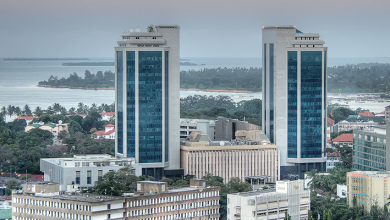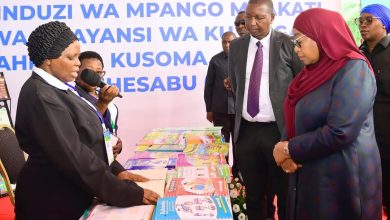COMMITMENT BY HEADS OF STATE: ‘Together, we can light up Africa

DAR ES SALAAM: AFRICAN Heads of State have stressed the importance of regional collaboration, leveraging renewable energy resources and fostering private sector involvement to close the energy access gap.
At the Mission 300 Energy Summit that concluded at the Julius Nyerere Internation al Convention Centre (JNICC) in Dar es Salaam yesterday, all leaders united in their commitment to achieving universal access to affordable, sustain able and reliable energy across Africa by 2030.
They outlined that through innovative solutions, cross-border energy integra tion and strong partnerships with development partners, their collective goal is to transform the continent’s energy landscape, empower communities, foster economic growth and improve livelihoods for all Africans.
Here is what they said….
President Lazarus Chakwera of Malawi
Malawi’s President Lazarus Chakwera pledged his country’s commitment, which focuses on strengthening collaboration with neighbouring countries to enhance trade and energy integration. He said, Malawi aims to increase electricity access from 14 per cent to 25 per cent, with a target of 70 per cent access by 2030.
“The goal is to ensure af fordable energy for all, especial ly in critical sectors such as edu cation, healthcare, and industry, while creating job opportunities for youths and women,” Presi dent Chakwera noted.
He insisted that Malawi is committed to fostering an environment that encourages both private and public sector collaboration to achieve sustainable energy goals.
President Denis Sassou Nguesso of Congo-Brazzaville
On his side, President De nis Sassou Nguesso of Congo-Brazzaville, revealed that the Congo Basin countries have organised an energy pool to facilitate the production, distribution and interconnectivity of energy within the region.
The Congo Basin is home to immense potential, with 20,000 megawatts of solar power and ongoing hydro power projects. “Congo-Brazzaville is focused on leveraging these resources to provide significant electricity to Africa and meet the continent’s energy needs,” he said, affirming his country’s commitment to working with the African Development Bank (AfDB), the World Bank and other partners to implement large-scale energy projects.
King Letsie III of Lesotho
King Letsie III of Lesotho stressed the importance of improving interconnectivity and transmission networks, to enhance energy trade within the Southern African Devel opment Community (SADC) region.
“Lesotho is dedicated to achieving universal energy access by 2030, focusing on renewable energy sources such as solar, wind and hy dropower,” he stated.
He added that the Kingdom is prioritising innovation in energy solutions and inclu sivity, particularly for rural communities.
“Lesotho is deploying mini-grids and standalone for clean energy at affordable costs. solar systems to power underserved areas, especially schools and hospitals, while attracting private-sector investment,” said the Lesotho leader.
ALSO READ: ENERGY ACCESS: ‘Africa must join forces’
President Azali Assoumani of Comoros
For his side, President Assoumani underlined the need for collaboration to provide electricity to 300 million Africans by 2030, highlight ing the role of private-public partnerships in achieving en ergy goals.
He informed delegates that the Indian Ocean archipelago is harnessing its geothermal and solar energy potential to contribute to regional energy needs, adding that the country is equally strengthening its regulatory frameworks to attract investment, with a focus on innovative financing mechanisms President Assoumani also noted the importance of cross border energy cooperation, including potential collaborations with Kenya to unlock geothermal energy expertise.
President Evariste Ndayishimiye of Burundi
Burundi’s Evariste Ndayishimiye stated that the East African nation is working with neighbouring countries like Tanzania and Ethiopia to strengthen interconnections and increase energy supply.
“The country is fostering a strong private-sector role in energy distribution and infra structure development, with a goal of providing energy to more than 70 per cent of the population by 2030,” he revealed.
President Ndayishimiye underlined Burundi’s commitment to achieving universal access to clean, affordable and sustainable energy by 2030, in line with the Sustainable Development Goals (SDGs).
He said his country’s plans include building hydroelectric and solar power plants, with a target of 396 megawatts from hydropower and 460 megawatts from so lar.
President of Sierra Leone, Julius Maada Bio
President Julius Maada Bio highlighted the impor tance of the energy agenda for Sub-Saharan Africa, saying that Sierra Leone’s eco nomic growth vision is tied to strategic investments and partnerships across four key sectors—agriculture, mining, infrastructure and industrial development—all of which require substantial invest ments in energy infrastructure and supply.
He called for private sector participation through transparent regulatory frame works, incentives for renew able energy investments, tax breaks and cost exemptions.
President Bio also shared that his government has established a mineral workforce to channel mining revenues into strategic investments.
President of Madagascar, Andry Rajoelina
President Andry Rajo elina pointed out Africa’s abundant resources, including water, solar and wind energy, which can be harnessed for clean energy. However, he said that over 600 million Africans still lack access to electricity, hindering development and industrialisation.
He explained that Mada gascar is facing a 20 per cent capacity shortfall in its hy droelectric plants due to the impacts of climate change, leading to higher costs and significant state subsidies.
To address this, Madagascar plans to invest in 250 megawatts of solar energy, aiming to generate 100 megawatts.
President Rajoelina called for solidarity among African nations, the African Development Bank, and the World Bank in supporting energy initiatives and ap pealed to financial and technical partners to accelerate funding for energy projects to speed up economic growth and eradicate poverty.
President of Zambia, Hakainde Hichilema
As one of the 12 coun tries that signed the energy compact in Dar es Salaam, Zambia President Hakainde Hichilema urged reforms in the energy sector, including bringing in independent pow er producers and improving transmission and distribution infrastructure.
He reaffirmed Zambia’s commitment to energy sector reforms and called for greater collaboration and action to achieve the goals of Mission 300.
Chairman of the Presiden tial Council of Libya, Dr Mohamed Al-Menfi
Dr Mohamed Al-Menfi of Libya stressed the need for a unified energy market through regional cooperation to reduce debt burdens and foster economies of scale. He also highlighted the importance of providing clean, affordable energy to millions of Africans who cur rently lack it, emphasising the role of education and devel opment in leveraging renew able energy sources like wind and solar.
President of Somalia, Hassan Sheikh Mahamud
President Mahamud Sheikh Mahamud expressed Somalia’s commitment to renewable energy access and the improvement of rural electrification through re newable energy integration. He called for collaboration and private-sector investment to achieve universal energy access across the country.
Transitional President of Gabon, General Brice Clotaire Oligui Nguema
President Oligui Nguema highlighted key milestones Africa is making in the jour ney toward universal energy access, mentioning Gabon’s current solar power project of 10 megawatts, with a need for further expansion and investments.
He expressed gratitude to the government of Tanzania and the African Union for hosting a platform to discuss matters that can propel the continent forward, stressing the importance of actively articulating declarations to reach energy access targets.
President of Liberia, Joseph Nyuma Boukai
President Boukai explained that only 32 per cent of Liberia’s population has access to electricity, with very limited access in rural areas.
He called for partnerships and funding to support the government’s financing and investment models aimed at expanding electricity access.
Representative of President Mohamed Ould Ghazouani of Mauritania Mauritania unveiled its commitment to implementing reforms to attract stable investment, strengthen pro duction and distribution networks and improve energy access.
The country aims to achieve 100 per cent electrification by 2030, supported by technical partners and stake holders.
Mauritania is committed to fostering innovation in the energy sector through reforms that promote the growth of renewable energy and the efficient distribution of electricity.





